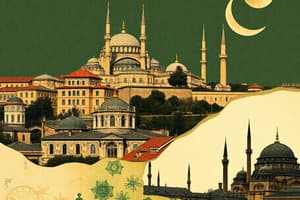Podcast
Questions and Answers
What was the original name of the city later known as Constantinople?
What was the original name of the city later known as Constantinople?
- Athens
- Rome
- Sparta
- Byzantium (correct)
What geographic advantage did Constantinople have that contributed to its importance?
What geographic advantage did Constantinople have that contributed to its importance?
- Surrounded by water on three sides (correct)
- Mountainous terrain for defense
- Rich agricultural land
- Proximity to the equator
What was the significance of Constantinople's location for trade?
What was the significance of Constantinople's location for trade?
- It facilitated trade between Europe and the Americas
- It was a center of trade between Asia and Europe (correct)
- It was a hub for trade with Africa
- It was primarily a local trading center
What was the original empire to which Constantinople belonged?
What was the original empire to which Constantinople belonged?
Who was the first Byzantine emperor after whom the city of Constantinople was named?
Who was the first Byzantine emperor after whom the city of Constantinople was named?
Which emperor established Constantinople and relocated his seat of power there in 324 C.E.?
Which emperor established Constantinople and relocated his seat of power there in 324 C.E.?
What was the original name of Constantinople when it was founded?
What was the original name of Constantinople when it was founded?
What monumental basilica was commissioned by Justinian in Constantinople?
What monumental basilica was commissioned by Justinian in Constantinople?
What caused friction in the Byzantine Empire despite the initial social mobility and acceptance of all races?
What caused friction in the Byzantine Empire despite the initial social mobility and acceptance of all races?
What event led to the destruction of Constantinople in 1453?
What event led to the destruction of Constantinople in 1453?
Flashcards are hidden until you start studying
Study Notes
The Founding and Legacy of Constantinople
- Social mobility and acceptance of all races in the Byzantine Empire were achievable through Greek name translations, but later, racial and class distinctions caused friction.
- Constantinople was established by Emperor Constantine the Great, who relocated his seat of power there in 324 C.E.
- Emperor Constantine built robust defenses for the city, including a harbor chain and a protective wall, and brought in more citizens by providing water and food.
- Initially named Nova Roma or New Rome, Constantinople was founded to associate Constantine with the power of the unified Roman Empire.
- The Byzantine Empire started with Constantine's move to New Rome, which was attractive due to reduced corruption, proximity to Persians, and the ability to accommodate a large population.
- Constantinople became the center of the Christian religion and the head of the Catholic Church under Emperor Constantine's authorization.
- The Byzantine Empire eventually lost control of its Western territories, but Constantinople thrived as the center of the Eastern territories until its destruction by the Ottoman Turks in 1453.
- Constantinople's central location in the Byzantine Empire allowed the emperor to lead the Eastern territories and was the site of great architectural and cultural works.
- Constantinople's strategic location on the Silk Road made it a hub for commerce between Europe and Asia, accumulating vast wealth for the city and the empire.
- Despite the prosperity from trade, traders were not highly regarded in the Byzantine Empire's hierarchy.
- The Hagia Sophia, commissioned by Justinian, was a monumental basilica with revolutionary architectural techniques and impressive artwork, later converted into a mosque by the Ottoman Turks.
- The Hippodrome of Constantinople, built for chariot racing by Septimus Severus, expanded to host various public events, reflecting the city's cultural significance.
Studying That Suits You
Use AI to generate personalized quizzes and flashcards to suit your learning preferences.




